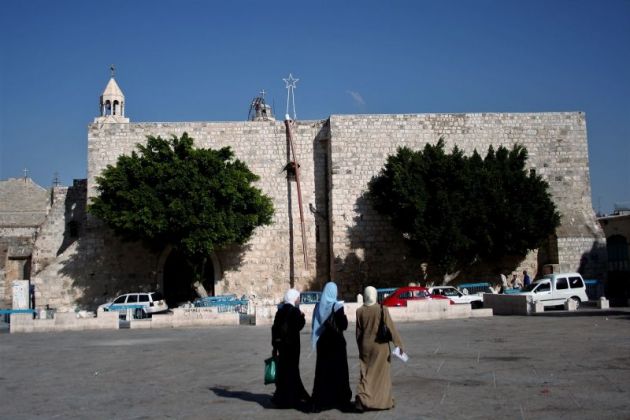Holy Land closed to pilgrims because of COVID for a second Christmas

Pilgrims usually crowds Bethlehem at this time of year, but the Holy Land is closed to international visitors for a second successive Christmas due to the COVID-19 pandemic.
"This Christmas, Bethlehem is preparing for a very 'Silent Night'," the Israeli newspaper Haarertz wrote on Dec. 21.
Before the Omicron variant of COVID-19 fears triggered a new Israelis tourist ban, residents of the Bethlehem were preparing for a sea of pilgrims this Christmas season.
Now the iconic church, the hotels and the shops stand empty, and locals are wondering how they will recover the losses, Haaretz reported.
Leading up to Christmas, tourists would usually mob the birthplace of Jesus.
Three Muslim women were the only visitors on the floor of Bethlehem's Church of the Nativity.
Covered in hijabs, in their long robes the women snapped photos posing near the altar, recently restored to its former glory as sparkled behind them.
"We get more Muslim visitors these days than Christians," a guard remarked. "They come from Hebron, Ramallah, Nablus, all over the region, to see how beautiful the church looks now that the restoration work is almost completed."
"But, from overseas," he noted, "there is hardly anybody."
For the second year, COVID-19 has disrupted Christmas celebrations in the town where Jesus is recorded as being born.
Back on Nov. 1, for the first time since the outbreak of the pandemic, Israel opened its borders to tourists, provided they were vaccinated or recovered.
But just three week later, when the new omicron variant discovered in southern Africa, those borders were sealed again.
Bethlehem is in the West Bank, about six miles (10 kilometers) south of Jerusalem and falls under the jurisdiction of the Palestinian Authority.
The West Bank has no airport, so overseas tourists traveling there must enter through Israel's Ben Gurion Airport.
So, restrictions on tourism hit the Palestinian area of special significance to Christians as well.
Turist entry ban has been extended until Dec. 29 and hihgly likely beyond that, due to Omicron's rapid spread.